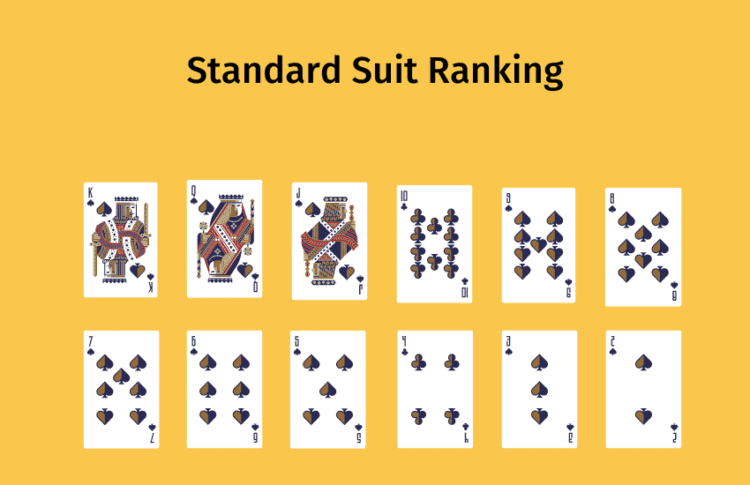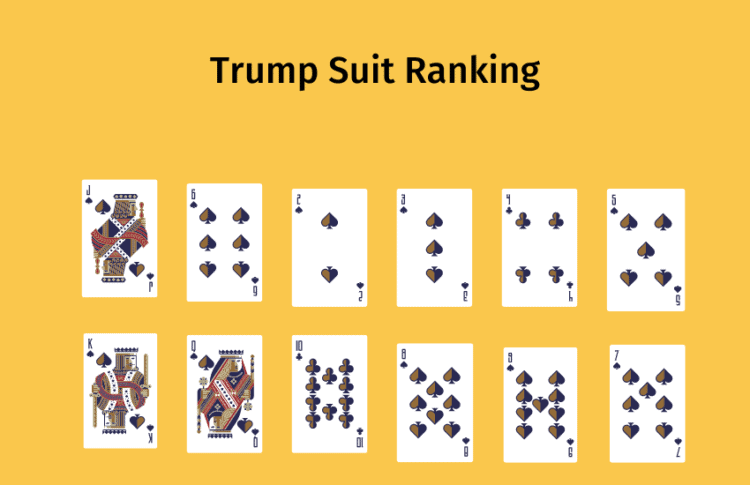
OBJECTIVE OF KARNÖFFEL: Win 3 of the 5 tricks in each round.
NUMBER OF PLAYERS: 2, 4, 6, or 8 players (4+ play in partnerships)
NUMBER OF CARDS: standard 52-card
RANK OF CARDS: K (high), Q, J, 10, 9, 8, 7, 6, 5, 4, 3, 2
TYPE OF GAME: Trick-Taking
AUDIENCE: Adult
INTRODUCTION TO KARNÖFFEL
Karnöffel (from the German language meaning thrash) is the oldest identifiable European card game still in existence, and it is still played today! It is believed to have been born in the 15th century, specifically 1426, in Nördlingen, Bavaria and was played at an annual festival. The game became most popular in Southern Germany. There the game was referred to as Kaiserpiel or Ludus Imperatoris, which means that Kaiser or Emperor’s game.
Karnöffel is theorized to be derived from the Persian word Kanjifeh. This was a card game played with the Mamluk pack of cards (the cards European cards descended from).
THE PARTNERS
In games of 4+ players, players play in partnerships. Partners should sit across from each other. Players draw cards to determine partnerships. The two players with the lowest cards become partners as do the highest. The player who draws the lowest card is the first dealer.
Cards rank: K (high), Q, J, 10, 9, 8, 7, 6, 5, 4, 3, 2

Suits rank: Spades (high), Clubs, Hearts, Diamonds
THE TARGET SCORE
Prior to starting the deal, players must mutually agree upon a target score. The score should be a multiple of 10 plus 1. Generally, the target score is 101. Rounds are worth 4 points. However, during the deal, players have three opportunities to increase the value by 3 points by a proposition. The proposal may be refused, the refusing side loses the current value and there’s a new deal by the next dealer.
During a deal, the trump suit is determined. The trump suit ranks differently than other suits.
THE DEAL
The deal begins with each card receiving one card face-up. The suit of the lowest ranking card dealt, or the first card of an equally low rank is the trump. In games with more than 2 players, the dealer hands the next card to the forehand. The forehand is the player directly to the left of the dealer. Then the dealer passes another card to the next player. Next, they wait. The forehand may propose to increase the value of the round. This increase is fixed at three points, for a total of a 7-point round. They may discuss this decision with their partner prior. If the forehand does propose, the other player may:
- Accept the increase
- Surrender. If so, the proposer’s side scores the 4 points and the proposer acts as the dealer in the next hand. OR,
- Propose another 3-point increase, for a total 10-point value round. The forehand can refuse this. If so, the proposer wins the 7 points and a new hand is dealt. If it is accepted, the round is worth 10 points.
The forehand is not required to propose, the other player may do so.
Second & Third Rounds
Players get 2 cards face-down in the second and third rounds. After the cards are dealt, there is another pause for proposals. Round value increases are still fixed at 3 points. Partners may privately share their hands before proposing or accepting/surrendering. If there are 6+ players, one player is appointed the director. The director examines their partner’s cards and decides what move to make.
If the value of the round is enough that one team may win, a player must announce this fact, and no one else may propose an increase. Unless, at the start, players are within four points of winning. They are not obliged to announce so.
THE PLAY
The game begins with the forehand leading the first trick. They may play any card but trump 7. The winner of the previous trick leads the next. The game ends once one side has won 3 tricks because they have scored the value of the round pre-determined during the deal. It is never required to follow suit. The winner of the trick, or the taker of the trick, is the player of the highest-ranking trump, special card, or if neither are played, the highest card of the suit led.
Cards rank in the following order: K, Q, J, 10, 9, 8, 7, 6, 5, 4, 3, 2
The trump suit contains only three full trumps, J, 6, 2, and three partial trumps 3, 4, 5. Other cards of the trump suit have no real trump power, they should be regarded as plain suit cards.
Below is a trump ranking:
Karnöffel (Jack): beats everything, the highest trump
Pope (6): trumps plain suits
Kaiser (2): trumps plain suits
3: trumps plain suits except for Kings
4: trumps plain suits except for Kings and Queens
5: trumps plain suits except for Jack, Queen, and Kings
K: no trump power
Q: no trump power
10: no trump power
9: no trump power
8: no trump power
The Devil: Only beaten by Karnöffel if led with, otherwise the 7 loses

The Devil, or trump seven, is a special card. It can beat every card but Jack of trumps, only if it is led with. Otherwise, it will always lose.
Endgame
The game ends when a team reaches the predetermined score is met, the team to do so first is the winning team.

If playing for stakes, when all the tricks are taken, the losers pay the winners the pre-determined stake. The stake is doubled if the losers score <1/2 the target score.
FREQUENTLY ASKED QUESTIONS
What is the ranking for Karnöffel?
The trump suit has a special ranking. It is Jack, 6, 2, 3, 4, 5, King, Queen, 10, 9, 8, and 7.
Standard suit ranking is King, Queen, Jack, 10, 9, 8, 7, 6, 5, 4, 3, 2
Is Karnöffel hard to learn?
As with the more complex card games, there can be a bit of a learning curve, especially if you are not familiar with card game mechanics at all. However, if you are interested in playing trick-taking card games more frequently, it is a good foundation game to have in your arsenal.
How do you win Karnöffel?
By reaching the determined score. This is done by winning a `round by earning at least 3 of the 5 tricks.
- Comprehensive Guide to the Board Game Go (weiqi, baduk) - January 23, 2024
- Are Creative Suites Changing Gaming - October 30, 2023
- How Classic Games Have Been Reimagined for Modern Audiences - October 5, 2023